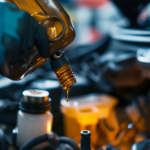Last Updated on 17 August 2023 by Lucas
Are you tired of spending unnecessary time and money on car repairs? In this article, we will guide you through the common car maintenance mistakes to avoid. By following our simple tips and recommendations, you can keep your vehicle in excellent condition and extend its lifespan. From checking fluid levels regularly to maintaining proper tire pressure, we’ll help you stay on top of crucial maintenance tasks. Say goodbye to costly repairs and hello to a well-maintained car!
Regularly Check and Maintain Fluid Levels
You should regularly check and maintain fluid levels in your car to avoid common car maintenance mistakes. The importance of regular fluid maintenance cannot be stressed enough. Neglecting this aspect can lead to serious consequences for your vehicle’s performance and longevity. One common mistake is forgetting to check the engine oil level regularly. Low oil levels can cause friction between moving parts, leading to engine damage and reduced efficiency. Another mistake is not checking the coolant level, which can result in overheating and potential engine failure. Additionally, failing to monitor the transmission fluid level may lead to gear shifting issues and costly repairs. By taking a few minutes every month to inspect and replenish essential fluids, you can prevent these problems from occurring and keep your car running smoothly for years to come.
Follow the Recommended Maintenance Schedule
By adhering to the recommended maintenance schedule, it is important to follow the guidelines for keeping your car in optimal condition. Regular car maintenance plays a crucial role in preventing breakdowns and costly repairs. Here are three common car maintenance mistakes to avoid:
-
Skipping scheduled oil changes: Oil lubricates the engine and without regular changes, it becomes dirty and loses its effectiveness, leading to engine damage.
-
Neglecting tire rotations: Uneven tire wear can affect your vehicle’s handling and fuel efficiency. Regular rotations help extend tire life and maintain proper traction.
-
Ignoring fluid flushes: Over time, fluids like coolant and transmission fluid break down, causing overheating or transmission failure. Flushing these fluids as recommended helps prevent major issues down the road.
Following the recommended maintenance schedule ensures that your car remains reliable, safe, and efficient for years to come. Don’t make these common mistakes – prioritise regular car maintenance!
Don’t Ignore Warning Signs or Strange Noises
When strange noises or warning signs arise, it’s important to address them promptly to prevent further damage. Ignoring these signals can lead to more extensive and costly repairs down the line. Common signs of car trouble include loud grinding or squeaking noises when braking, a shaking steering wheel, engine misfires, or a dashboard warning light that stays on. Don’t dismiss these signs as mere inconveniences; they are your car’s way of telling you that something is wrong. Regular car inspections are crucial in detecting and resolving issues before they become major problems. Make sure to schedule routine maintenance checks with a trusted mechanic who can identify any potential issues early on. By taking immediate action and not ignoring warning signs or strange noises, you’ll save yourself from expensive repairs and keep your vehicle running smoothly for longer.
Keep Tires Properly Inflated and Rotate Them Regularly

Keeping tires properly inflated and regularly rotating them is essential for maintaining optimal vehicle performance. Proper tire inflation helps ensure even wear and extends the lifespan of your tires. It also improves fuel efficiency and enhances handling and braking capabilities. Make it a habit to check your tire pressure regularly using a reliable gauge, especially before long trips or during extreme temperature changes. Additionally, regular rotation allows each tire to experience different positions on the vehicle, promoting more balanced wear and prolonging their life. It’s recommended to rotate your tires every 5,000 to 7,000 miles or as advised by your vehicle manufacturer. Lastly, don’t forget about wheel alignment! Proper alignment ensures that all four wheels are parallel and reduces uneven tread wear. Keep these maintenance tasks in mind to avoid costly repairs and accidents down the road.
Change the Oil and Filter on Time
Don’t forget to change the oil and filter on time to maintain optimal vehicle performance. Regularly inspecting the air filter and engine coolant levels is crucial for preventing damage to your engine and ensuring smooth operation. The air filter keeps dirt and debris from entering the engine, while the coolant regulates its temperature. By checking these components regularly, you can catch any issues early on and avoid expensive repairs down the line. Another important aspect of proper car maintenance is properly storing your vehicle during extreme weather conditions. This includes parking it in a covered area or using a car cover to protect it from harsh elements like snow, rain, or excessive heat. Taking these simple steps will help extend your car’s lifespan and keep it running smoothly for years to come.
Clean and Replace Air Filters

Regularly cleaning and replacing air filters is crucial for maintaining optimal vehicle performance. By taking care of your air filters, you can improve their performance and avoid potential car maintenance mistakes. Here are some ways to improve air filter performance:
-
Clean or replace the air filter regularly: A dirty air filter can restrict airflow, reducing engine efficiency. Check your owner’s manual for recommended intervals.
-
Inspect the filter for signs of dirt and debris: If you notice dust, leaves, or other particles on the filter, it’s time for a cleaning or replacement.
-
Use compressed air to blow out any trapped debris: This will help remove stubborn dirt from the filter without damaging it.
-
Consider upgrading to a high-performance air filter: These filters provide better filtration and increased airflow, resulting in improved fuel efficiency and horsepower.
Remember that a dirty air filter can lead to reduced gas mileage, decreased engine power, and even damage to other engine parts. Stay proactive by keeping your air filters clean and replacing them when necessary!
Inspect and Replace Worn Out Belts and Hoses
Inspecting and replacing worn-out belts and hoses is essential for maintaining the overall performance of your vehicle. Regular maintenance for belts and hoses is crucial because these components play a vital role in the proper functioning of your car’s engine and other systems. Over time, belts can become cracked or brittle, while hoses may develop leaks or bulges. These signs of wear and tear should not be ignored as they can lead to serious issues such as engine overheating or loss of power steering. When inspecting your belts, look out for fraying edges or excessive slack. For hoses, check for any visible cracks, soft spots, or coolant leakage. If you notice any of these warning signs, it is important to promptly replace the worn-out belts and hoses to avoid costly repairs down the line.
Check and Replace Worn Out Brake Pads
To ensure the safety of your vehicle, make sure to check and replace worn-out brake pads. Neglecting this crucial maintenance can lead to decreased stopping power and potential accidents. Here’s what you need to know:
- How to choose the right brake pads:
- Consider your driving style: If you drive aggressively or tow heavy loads, opt for high-performance or ceramic pads.
- Check manufacturer recommendations: Consult your vehicle’s manual or ask a professional for guidance on which type of brake pads are best suited for your specific model.
- Quality matters: Invest in reputable brands that prioritise durability and reliability.
Signs of worn-out brake pads include squealing or grinding noises, reduced braking responsiveness, and vibrations while braking. If you notice any of these symptoms, don’t delay – replace your brake pads promptly. Remember, maintaining properly functioning brakes is essential for both your safety and that of others on the road.
Keep the Battery and Electrical System in Good Condition

Make sure you keep the battery and electrical system in good condition to prevent any potential issues. Battery maintenance is crucial for ensuring that your car starts up every time you turn the key. It’s important to regularly inspect the battery terminals for corrosion and clean them if necessary. Additionally, check the battery’s fluid levels and top it off with distilled water if needed. If you notice any signs of a weak or dying battery, such as slow cranking or dimming lights, consider getting it tested and replaced if necessary.
In addition to battery maintenance, it’s also essential to troubleshoot your car’s electrical system regularly. Pay attention to any warning signs like flickering headlights or blown fuses as these could indicate an underlying issue. Use a multimeter to test the voltage output of your alternator and ensure that it is functioning properly.
By keeping up with regular battery maintenance and troubleshooting your electrical system, you can avoid common car maintenance mistakes and prolong the life of your vehicle.
Keep Your Car Clean and Protected

Now that you have learned the importance of keeping the battery and electrical system in good condition, let’s move on to another crucial aspect of car maintenance – keeping your car clean and protected. Regularly cleaning your car not only enhances its appearance but also helps prevent damage caused by dirt, dust, and debris. One effective way to protect your car’s exterior is by applying a coat of wax regularly. Car waxing provides a protective layer that shields your vehicle from harsh weather conditions, UV rays, and minor scratches. Additionally, don’t forget about the interior! Regular interior detailing helps maintain the value of your car and creates a comfortable driving experience. Vacuuming carpets, wiping down surfaces, and treating leather seats are all essential steps in keeping your car’s interior clean and well-maintained.
- Remove any trash or clutter from the interior
- Use appropriate cleaning products for different surfaces
- Pay attention to areas prone to spills or stains
- Don’t forget to clean windows inside and out

Lucas is an experienced vehicle technician with hands-on knowledge of almost every car brand available. Throughout his career, Lucas has worked on a wide range of vehicles, including domestic and foreign models, sports cars, trucks, and SUVs.




